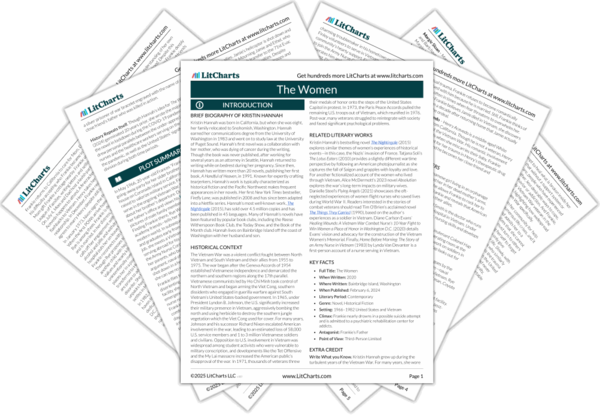Henry Acevedo Quotes in The Women
Frankie heard the distinctive whine of a mortar rocket and the crash of its explosion.
She screamed, “Incoming!,” and dropped to the ground.
Silence.
Frankie blinked.
She was sprawled in the grass in her parents’ backyard. What the hell? She crawled to her knees, feeling weak.
Someone had set off a firecracker. A bottle rocket, probably.
And she’d hit the ground. What was wrong with her?
[…]
“Those idiots who get their firecrackers and bottle rockets from Mexico should be in jail,” he said.
Was he saying it was normal to hear that and hit the ground?

Unlock explanations and citation info for this and every other The Women quote.
Plus so much more...
Get LitCharts A+“Your pride should come from caring for your husband and child. Women going to war…” He shook his head.
“If I’d been a son who went to Vietnam and came home in one piece, would my photograph be on the wall, Dad?”
“You’re upsetting me with this jabble, Frankie. You’re my daughter. You had no business going to war and I told you so at the time. Now we find out we shouldn’t even have been fighting the damn war in the first place and we are losing. America. Losing a war. Who wants that reminder? Let it go, Frankie. Forget and move on.”
The pills her mother had given her helped to take the edge off of her pain. She learned that two sleeping pills softened the nightmares and helped her fall asleep, but when she woke, she felt lethargic, unrested. One of the Mother’s Little Helpers perked her right up, maybe even gave her too much energy. Enough so that she needed the pills again to calm down enough to sleep. It became a cycle, like the ebb and flow of the tide.
She stopped visiting her parents, stopped answering the phone, stopped writing letters to her friends. She didn’t want to hear their pep talks, and no one wanted to listen to her despair.
“It’s called post-traumatic stress disorder. It’s a bit controversial, they haven’t added it to the APA manual yet, but we’re seeing similar symptoms in your fellow vets. What you’re experiencing is a familiar response to trauma.”
“I didn’t see combat.”
“Frankie, you were a surgical nurse in the Central Highlands.”
[…]
Henry leaned forward. “War trauma isn’t a competitive sport. Nor is it one-size-fits-all. The POWs are a particular group, as well. They came home to a different world than you did. They were treated like the World War II veterans. Like heroes. It’s hard to underscore too much the impact of that on one’s psyche.”
Frankie thought about all the yellow ribbons on the tree branches in 1973. They hadn’t been there when she came home. Hell, they’d had parades for the returning POWs. None of them had been spat on or flipped off or called a baby killer or a warmonger.

Henry Acevedo Quotes in The Women
Frankie heard the distinctive whine of a mortar rocket and the crash of its explosion.
She screamed, “Incoming!,” and dropped to the ground.
Silence.
Frankie blinked.
She was sprawled in the grass in her parents’ backyard. What the hell? She crawled to her knees, feeling weak.
Someone had set off a firecracker. A bottle rocket, probably.
And she’d hit the ground. What was wrong with her?
[…]
“Those idiots who get their firecrackers and bottle rockets from Mexico should be in jail,” he said.
Was he saying it was normal to hear that and hit the ground?

Unlock explanations and citation info for this and every other The Women quote.
Plus so much more...
Get LitCharts A+“Your pride should come from caring for your husband and child. Women going to war…” He shook his head.
“If I’d been a son who went to Vietnam and came home in one piece, would my photograph be on the wall, Dad?”
“You’re upsetting me with this jabble, Frankie. You’re my daughter. You had no business going to war and I told you so at the time. Now we find out we shouldn’t even have been fighting the damn war in the first place and we are losing. America. Losing a war. Who wants that reminder? Let it go, Frankie. Forget and move on.”
The pills her mother had given her helped to take the edge off of her pain. She learned that two sleeping pills softened the nightmares and helped her fall asleep, but when she woke, she felt lethargic, unrested. One of the Mother’s Little Helpers perked her right up, maybe even gave her too much energy. Enough so that she needed the pills again to calm down enough to sleep. It became a cycle, like the ebb and flow of the tide.
She stopped visiting her parents, stopped answering the phone, stopped writing letters to her friends. She didn’t want to hear their pep talks, and no one wanted to listen to her despair.
“It’s called post-traumatic stress disorder. It’s a bit controversial, they haven’t added it to the APA manual yet, but we’re seeing similar symptoms in your fellow vets. What you’re experiencing is a familiar response to trauma.”
“I didn’t see combat.”
“Frankie, you were a surgical nurse in the Central Highlands.”
[…]
Henry leaned forward. “War trauma isn’t a competitive sport. Nor is it one-size-fits-all. The POWs are a particular group, as well. They came home to a different world than you did. They were treated like the World War II veterans. Like heroes. It’s hard to underscore too much the impact of that on one’s psyche.”
Frankie thought about all the yellow ribbons on the tree branches in 1973. They hadn’t been there when she came home. Hell, they’d had parades for the returning POWs. None of them had been spat on or flipped off or called a baby killer or a warmonger.











